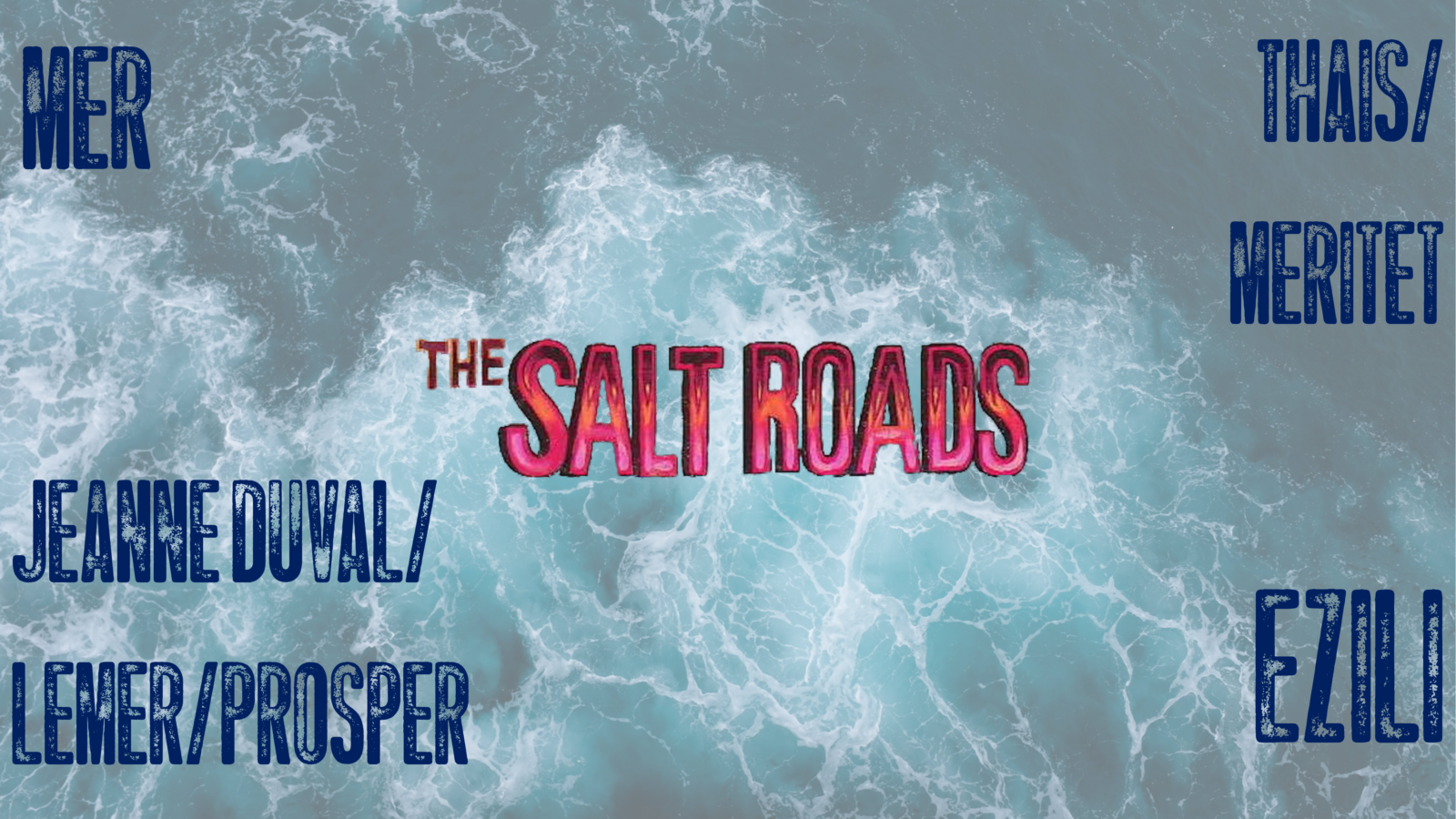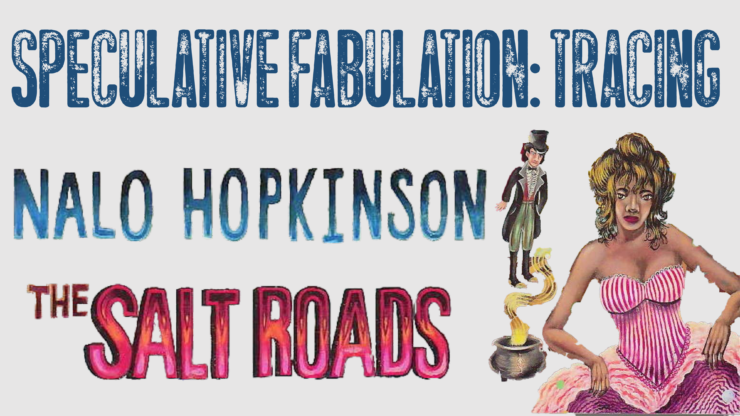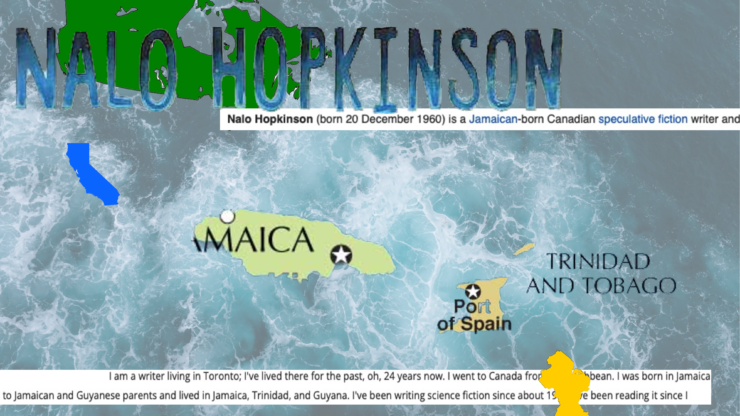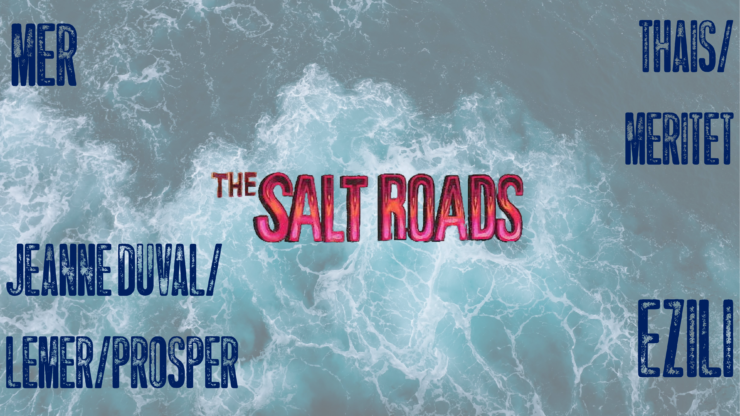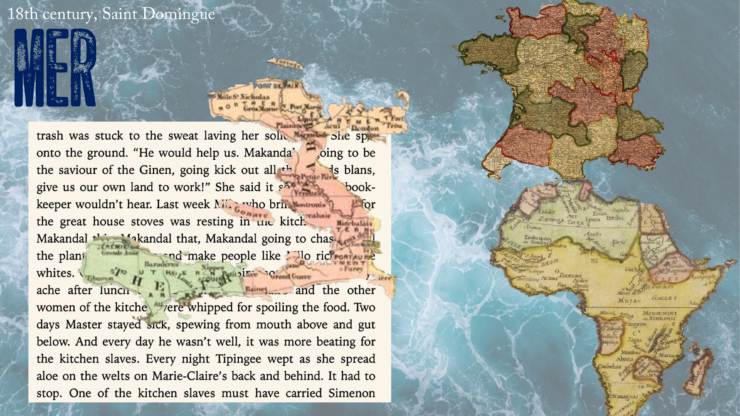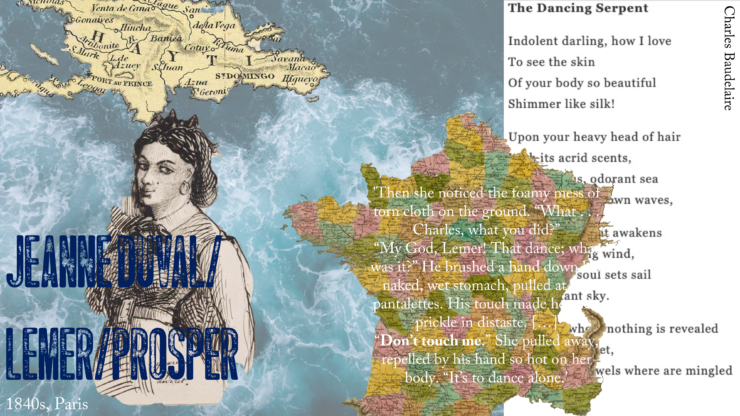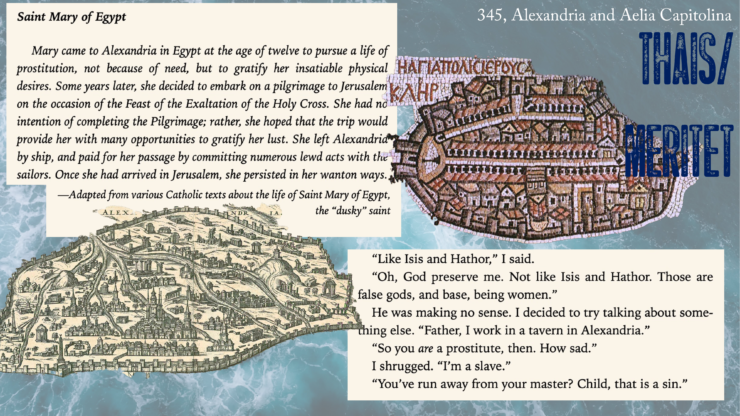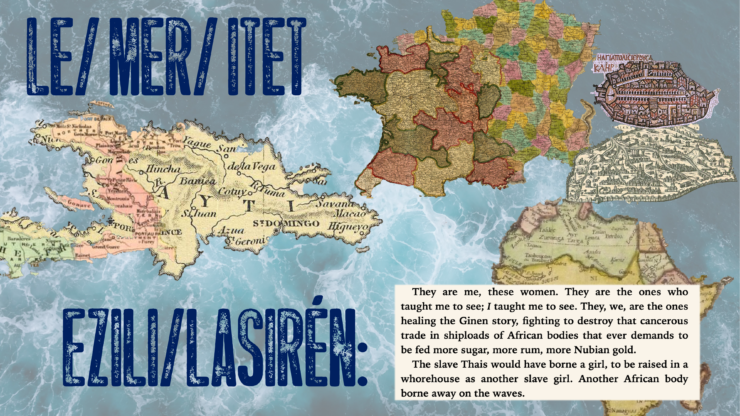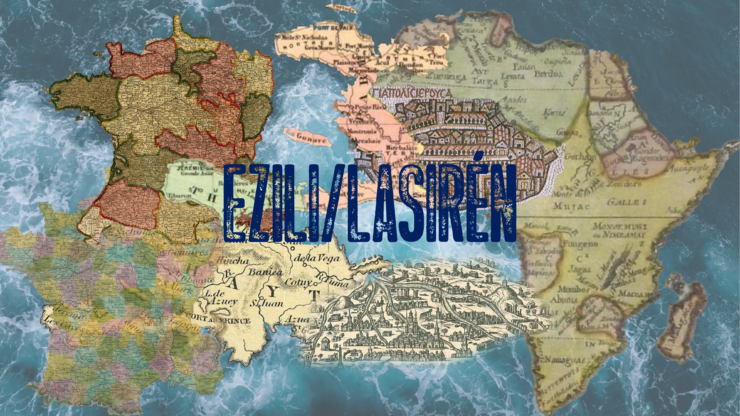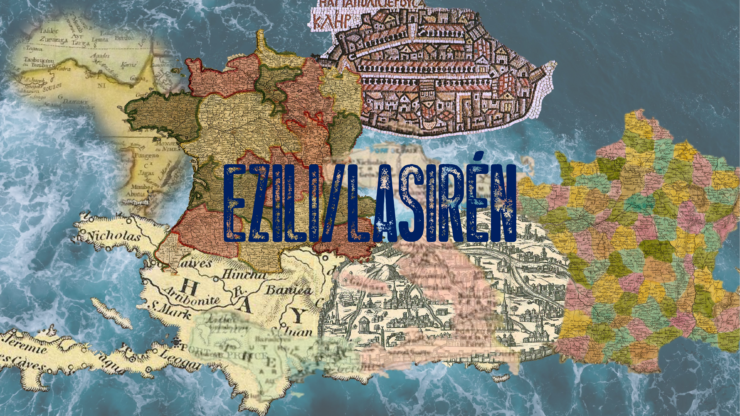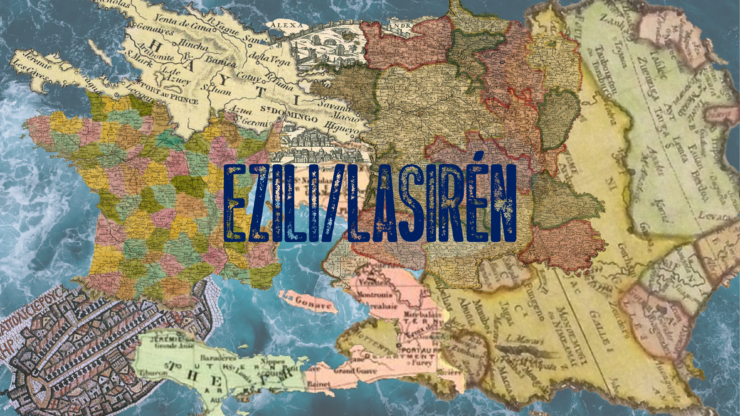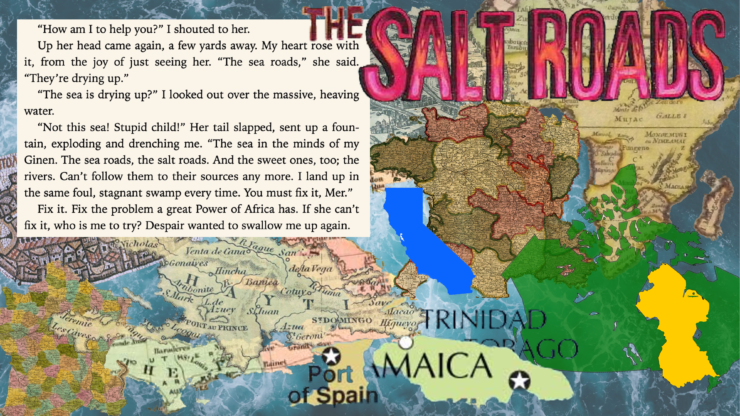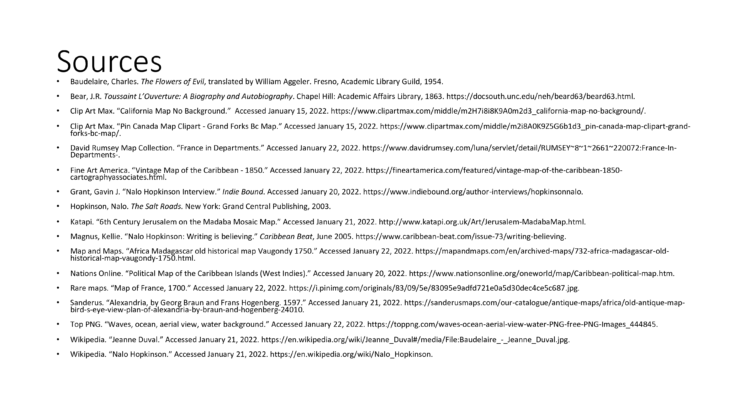Caribbean
Performing a speculative geopoetics by mapping Nalo Hopkinson’s The Salt Roads – Danny Steur
To offer a cultural map of the Caribbean, the archipelago profoundly characterized by transculturality and historical, political, social and other kinds of entanglements and Creolization, I used The Salt Roads, written by Jamaican-born speculative fiction writer Nalo Hopkinson, as a point of departure to offer a rendition of the ways in which sociopolitical, cultural and linguistic currents traverse this complex space. The Salt Roads interweaves multiple narratives in vastly different spatiotemporal settings, from the perspectives of four characters: the enslaved Ginen medicine woman Mer (Ginen denoting the part of the “Vodu religion that establishes a direct link between Haitian Vodu devotees and their African ancestral land”), whose story unfolds during the revolutionary rumblings on 18th-century Saint-Domingue (the historically French-colonized part of the island Hispaniola); Jeanne Duval (also called Lemer), a Haitian historical figure known for being Charles Baudelaire’s mistress in 1840s Paris; Thaïs (or Meritet), an enslaved Nubian prostitute living in Egypt in 345; and Ezili, a Yoruba water deity who alternately encounters and possesses the three other women and so ties the novel’s disparate storylines together.[1] Through these characters, Hopkinson engages in a radically imaginative practice of speculative, critical historical fabulation, rewriting established histories from the submerged perspectives of Black women – like Makandal’s slave rebellion on Saint-Domingue (Mer’s story), Duval’s affair with Baudelaire, and the Christian legend of Mary of Egypt (Thaïs’s story).[2]
In order to chart these diverse transnational and transcultural influences through different times, I decided to map the various relata within this entangled web of confluences not onto a single map (which could not capture these vastly geographically and historically disparate currents), but rather depict them through a series of maps. These maps, taken together, are meant to visually perform the transculturality and critical historical fabulation of Hopkinson’s narrative. To construct the maps, I have taken not entire world maps but rather cut out the contours of the nation states involved in the different narrative strands (each gets their own map) and emplaced them into a particular relation with each other – sometimes similar to their geographical placements and proportions, sometimes vastly warped and defamiliarized to establish a speculative contestation of the power of geography as a colonial extractivist world-making force that abstractly renders territories into terra nullius, as void and for the taking.[3] In this way I hope to initiate a sort of speculative geopoetics, which denotes a poetics that “constructively reinscribe[s geographical features and geophysical forces as elements of geopolitics] as a means to counter imperialist aspirations and hegemonic worldviews.”[4]
The first map charts Hopkinson’s own biography, showing the countries central to her own development through cut-outs from contemporary world maps: Jamaica, Canada, Guyana, Trinidad and Tobago, and the state of California. Thereafter, successive maps display the regions or nation states involved in each of the four central characters’ narratives – though the notion of the nation states is not applicable to all the historical times during which Hopkinson’s narrative unfolds. To thus historicize and show the contingency of the nation state, I have used maps that existed from the time that the various narratives play out (or close to that time), which further adds to the estranging, defamiliarizing effect of this visual speculative geopoetics: familiar formations and demarcations are destabilized because both national borders have shifted over the ages, and because the faculties and abilities of cartography have changed. I furthermore emphasize the critical historical fabulation of Hopkinson’s novel by including a particularly illuminating quotation from the novel with each character’s map, showing how they are given historical agency, as opposed to their erasure from dominant archives and histories. The final maps bring the speculative geopoetics to a close by including all the regions crucial to The Salt Roads and remixing and reconfiguring them multiple times over, making them enact different ways of crossing, overlapping, and fading into one another – to visually, cartographically perform transculturality in a speculative key.
Works cited
Akante, Molefi Kete, and Ama Mazama, eds. Encyclopedia of African Religion. London: SAGE, 2009.
Hartman, Saidiya V. “Venus in Two Acts.” Small Axe 12, no. 2 (2008): 1–14.
Hopkinson, Nalo. The Salt Roads. New York: Grand Central Publishing, 2003.
Last, Angela. “Fruit of the Cyclone: Undoing Geopolitics through Geopoetics.” Geoforum 64 (2015): 56–64.
Marinkova, Milena. “Revolutionizing Pleasure in Writing: Subversive Desire and Micropolitical Affects in Nalo Hopkinson’s The Salt Roads.” In Postcolonial Literatures and Deleuze, edited by Lorna Burns and Birgit M. Kaiser, 181–98. London: Palgrave Macmillan UK, 2012.
Schacherreiter, Judith. “Propertization as a Civilizing and Modernizing Mission: Land and Human Rights in the Colonial and Postcolonial World.” In Decolonizing Enlightenment: Transnational Justice, Human Rights and Democracy in a Postcolonial World, edited by Nikita Dhawan, 227–42. Leverkusen: Barbara Budrich Publishers, 2012.
[1] Molefi Kete Akante and Ama Mazama, eds., Encyclopedia of African Religion (London: SAGE, 2009), 281-282.
[2] Saidiya V. Hartman, “Venus in Two Acts,” Small Axe 12, no. 2 (2008): 11;
Milena Marinkova, “Revolutionizing Pleasure in Writing: Subversive Desire and Micropolitical Affects in Nalo Hopkinson’s The Salt Roads,” in Postcolonial Literatures and Deleuze, ed. Lorna Burns and Birgit M. Kaiser (London: Palgrave Macmillan, 2012), 193-195.
[3] Judith Schacherreiter, “Propertization as a Civilizing and Modernizing Mission: Land and Human Rights in the Colonial and Postcolonial World,” in Decolonizing Enlightenment: Transnational Justice, Human Rights and Democracy in a Postcolonial World, ed. Nikita Dhawan (Leverkusen: Barbara Budrich Publishers, 2012), 230.
[4] Angela Last, “Fruit of the Cyclone: Undoing Geopolitics through Geopoetics,” Geoforum 64 (2015): 57.

